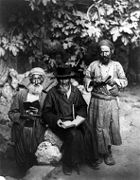- Obadiah ben Abraham
-
Obadiah ben Abraham of Bertinoro (Hebrew: עובדיה בן אברהם מברטנורא) was a 15th-century rabbi best known for his popular commentary on the Mishnah, commonly known as "The Bartenura".
He was born and lived in the second half of the 15th-century in Italy and died in Jerusalem, Palestine about 1500. He was a pupil of Joseph Colon Trabotto (Maharik), and became rabbi in Bertinoro, a town in the province of Forlì, whence he derived his by-name, and in Castello.
Contents
Arrival in Palestine
Old Yishuv 
Jewish life in the Land of Israel before Modern Zionism Key figures Nahmanides • Yechiel of Paris • Bartenura • Yehuda he-Hasid Finance Kollel • Halukka • Etrog Communities Sephardim • Perushim • Hasidim Synagogues Ramban • Ari • Hurva • Shomrei HaChomos Related articles History of the Jews in the Land of Israel • History of Zionism (Timeline) • Anti-Zionism (Timeline) • Haredim and Zionism • Edah HaChareidis • ShaDaR • Yishuv • Three Oaths The desire to visit the Land of Israel led him to Jerusalem; and he arrived there on March 25, 1488, having commenced his journey October 29, 1486. His advent marked a new epoch for the Jewish community there. The administration of Jewish communal affairs in Jerusalem had fallen into the hands of iniquitous officials. The poor were harshly taxed for the Muslim government; the rich were similarly treated and driven from the city by exorbitant demands upon them, so that the Jewish community was on the brink of ruin.
Influence in Palestine
Bertinoro's personality, eloquence, and great reputation as a scholar led to his being accepted as the spiritual head of the community immediately upon his arrival. His first care was to raise the intellectual plane of the community, and for this purpose he interested the younger generation in the study of the Talmud and rabbinic literature, and he delivered sermons every other Shabbat in Hebrew, although the vernacular language was Arabic, one which Bertinoro never acquired.
His connections in Italy supplied him with money for the support of the poor, which also added not a little to his influence. He succeeded in securing the abolition of the annual tax of 400 ducats, which had afforded such opportunity for oppression and injustice; in lieu a simple poll-tax payable direct to the government was instituted.
When, on the expulsion of the Jews from Spain in 1492, many of the exiles settled in Jerusalem, Bertinoro became their intellectual leader. These Spanish Jews presented Bertinoro with a site for a yeshivah in Jerusalem, which he founded, more than a thousand years after the extinction of the last academy in Palestine. Considerable support for the maintenance of the yeshivah was given by the Jews of Egypt and Turkey at Bertinoro's written solicitation. Isaac ben Nathan ibn Shulal, naggid or prince of Egypt, was especially helpful.
In the decade during which Bertinoro thus controlled the best interests of the Jewish community at Jerusalem, a radical change for the better developed. Shortly after his arrival he had actually been compelled upon one occasion to dig a grave because the community had provided no one to perform that labor; a few years later there had come into existence such benevolent institutions as hospitals, charitable relief societies, and similar associations, all under excellent management. His fame spread to all parts of the Orient, and he came to be looked upon as a rabbinical authority of the highest eminence; even the Muslim population frequently called upon him to decide judicial cases. He harshly reproved rabbis for exacting fees for services at weddings and divorces, a custom then general in Germany. He believed it their duty to perform religious ceremonies without monetary remuneration.
Literary activity
Bertinoro is usually known as the best commentator of the Mishnah; the importance of his commentary is illustrated by the fact that since its appearance (Venice, 1549) hardly an edition of the Mishnah has been printed without it. The commentary is based mainly on Rashi and the Rambam.
Bertinoro is also the author of a supercommentary upon Rashi's Torah commentary (published under the title Amar Neké [Pure Wool, from Dan. 7:9], Pisa, 1810; reprinted in the collective work Rabbotenu Ba'ale ha-Tosafot, Warsaw, 1889).
Some liturgical productions by Bertinoro exist in manuscript in the Bodleian Library, Oxford (numbers 1061; 2266, 6; in the first the name of his father is mentioned). He also wrote descriptions of his travels; and his letters to his relations in Italy, although intended only as private communications, are of great historical value. Most interesting in these letters (first published by S. Sachs in the Jahrbuch für Geschichte der Juden 1863; 3:195-224) is the fund of information concerning the social and intellectual conditions of the Jews in Greece, Egypt, and Palestine. He shows himself not only a close observer, but a conscientious and unprejudiced chronicler. For example, he studied attentively the conditions of the Karaites in Alexandria, and did not hesitate to praise them for the possession of the very virtues which the Rabbinites denied to them, such as generosity and liberality (l.c. p. 208; the text is to be emended according to the manuscript mentioned in Steinschneider, Hebr. Bibl. vi.131). His description of the Samaritans in Egypt (l.c., pp. 206–208) is one of the most valuable and reliable of medieval times.
References
- This article incorporates text from the 1901–1906 Jewish Encyclopedia, a publication now in the public domain.
- BERTINORO, OBADIAH (YAREH) B. ABRAHAM, in Jewish Encyclopedia
Categories:- Rishonim
- 15th-century rabbis
- Rabbis in Ottoman and British Palestine
- Commentaries on the Mishnah
- 15th-century births
- 1500s deaths
- 15th-century Italian rabbis
- Rabbis whose tombs have become pilgrimage sites
- Burials at the Mount of Olives (Jewish)
Wikimedia Foundation. 2010.
